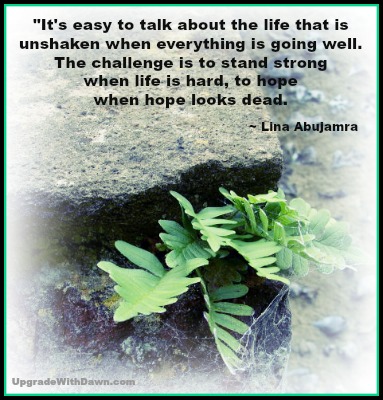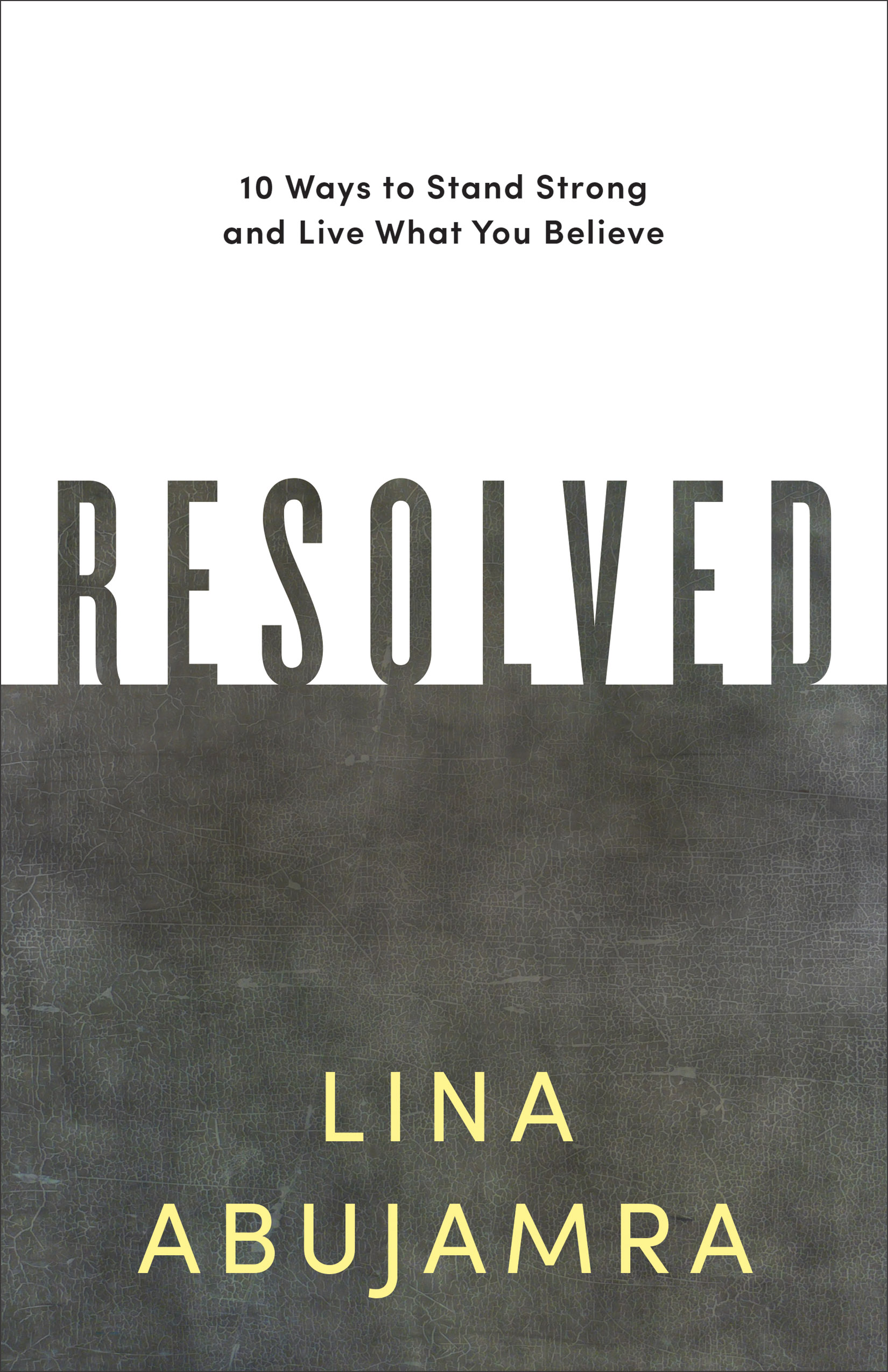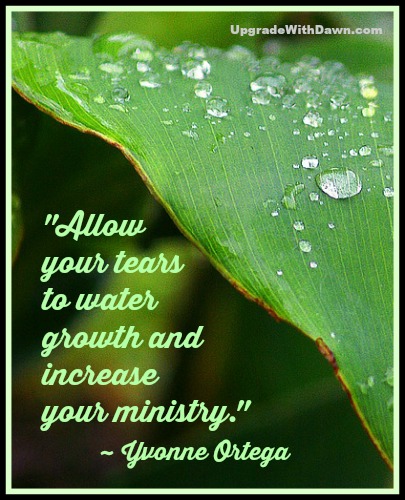Lina Abujamra is a pediatric ER doctor and she's seen a lot of "hurts" in life, but in this Attitude UPGRADE, she offers practical counsel for hope through the tears.
"Wouldn't it be nice if we could take a pill to make the pain go away? But things are never that simple," Lina says. "Some days feel like torture, and it hurts."
 Oh, yes, I (Dawn) have looked for that magical bottle of pills; but Lina says there is real hope—we just have to know where to find it. (This article is longer than the usual UPGRADE posts, but I think this is a message so many of us need to hear today.)
Oh, yes, I (Dawn) have looked for that magical bottle of pills; but Lina says there is real hope—we just have to know where to find it. (This article is longer than the usual UPGRADE posts, but I think this is a message so many of us need to hear today.)
Lina continues . . .
Motivational speakers try to teach us to use positivity to overcome our pain. But I've found myself in places in my life where no amount of positive mental thinking will work me out of my pit of despair.
Hope is more than a positive mental attitude. God has given us far more than positivity. He's given us His Son who demonstrated victory by rising from the dead. He's given us His Spirit to enable us to live out the Christian life the way He lived out His: victoriously and triumphantly.
Yet so many of us are failing. I'm embarrassed to tell you how often I've crumbled under the pressure of pain. This crumbling reveals itself in a variety of shapes and forms of my life: misplaced anger, inpatient frustration, whining and complaining, and once in a while, the pit of self-pity and even a few potholes of despair.
But this is not the end of the story.
It was a seven-mile walk from Jerusalem to Emmaus, and on that day the walk felt like an interminable journey of sorrow. (Read Luke 24:13-27). The two disciples were weighed down by their pain. They had expected God to do the impossible. They had expected the Messiah to take over the world.
Suddenly a man came walking up alongside them. The man was Jesus risen from the dead, but the disciples had not been given the ability to recognize him yet.
They told Him what they were talking about: "Jesus of Nazareth, a man who was a prophet mighty in deed and word before God and all the people, and how our chief priests and rulers delivered him up to be condemned to death, and crucified him" (vv. 19-20).
But the worst was yet to come. The disciples then uttered three fatal words of defeat that were the nail on the coffin of their pain: "But we had hoped that he was the one to redeem Israel" (verse 21).
We. Had. Hoped.
Have you ever uttered these three words of hopelessness, not knowing that victory was already on the way? Have you ever misinterpreted the most painful event in your life without any idea of the miracle God was already working out on your behalf?
I can't keep track of the times that I've given up on God and twisted things around in my head and assumed that my pain was final, that I'd been defeated, while all along God was walking right next to me, preparing the victory for me. You too?
The disciples on the road to Emmaus had put a period were God had put a comma.
They had written off the Lord when God hadn't even started yet. They had sunk into despair when hope was on the way.
It's easy to talk about the life that is unshaken when everything is going well.
People flocked to Jesus when he fed the 5000 and cure diseases. It was at the cross that everyone fled. That's what pain will do. It tests our mettle. It crystallizes what we really believe.
Anyone can boast in the Lord when their dreams have come true and their prayers have been answered. The challenge is to stand strong when life is hard, to hope when hope looks dead.
There are four things I know for sure:
- Pain exist.
- Pain has a cause.
- Pain can be treated but it's far better to treat its cause.
- Pain doesn't have to define you.
We can talk about the resurrection until we're blue in the face, but the way to show if we really believe it is by watching how we respond to the pain in our lives. When it comes to using the pain in your life as fuel for godliness, here are a few tools you can use for victorious living.
Five Painkillers You Can Use:
1. Lighten Up on the Clichés.
Clichés are nothing more than old-fashioned tweets. Pithy quotes might motivate us for a minute, but their effect is short-lived. What we need is life change.
What I long for is the transformed, powerful life that Christ promised us. We need upside-down, inside-out radical living that no litany of clichés will produce, but is rightfully ours in Christ Jesus by faith. The more of God's Word that we hide in our hearts, the more it will give us strength when we need it the most.
2. Let Go of the Blame Game.
When a kid comes into the ER with a cut, families get caught up in how it happened and whose fault it was. The truth is that it doesn't matter who did what. There's a cut, and it hurts, and it must be fixed.
When Adam and Eve sinned, Adam blamed Eve and Eve blamed the serpent, but the fact remains that all of us humans are still suffering because of today. Instead of blaming each other, Adam and Eve should've acknowledged the wrong and accepted God's mercy, then adapted to their new normal outside of Eden.
When Job went through his painful trials, his wife begged him to blame God and his friends blamed him for his own problems. Unlike Adam and Eve, Job was innocent and had done nothing to deserve his pain, yet the blame game was just as much a part of Job story as it was for our first parents.
Blaming someone else for pain is natural and gives us a temporary sense of control. It might even help us come up with an explanation for the pain. But it doesn't work.
What works far better than the blame game is recognizing God's sovereign control over our lives.
It's understanding that God didn't find Adam and Eve in the garden to shame them but rather to cover them. It's accepting Christ forgiveness for sin. It's extending that same forgiveness to those who seem to be the cause of her pain.
3. Get Off the Self-pity Train.
Self-pity is defined as a self-indulgent attitude concerning our hardships. The problem with self-pity is that it believes it has been wronged. It's an attitude that dislocates the Christian from a sovereign God Who is behind every detail and circumstance.
Charles Spurgeon once said, "God is too good to be unkind. He is too wise to be confused. If I cannot trace His hand, I can always trust his heart."
The biggest lie that Satan will throw your way is the God doesn't care about you anymore, and self-pity slowly feeds that lie. God does care about you (1 Peter 5:7). The self-pity train can kill you if you don't guard against its lies with the truth of God's Word. It's time you jump off that train and run toward grace.
4. Bury Your Past at the Cross.
Paul killed Christians before he became a Christ-follower. Yet God used Paul to write the bulk of the New Testament and to build the church. How did Paul deal with his past? His solution was to bury his past at the foot of the cross (Philippians 3:13-14).
It's time to get rid of the Rolodex of sin. Failure is the best teacher you'll ever find. Learn from it, then let it go.
Your past might be part of who you are, but it has no power over you. Use it to rejoice in God's mercy and grace and move onward and upward. Use it as your platform to highlight God's love and grace and watch God use your past to change your world like He did with the apostle Paul!
5. Leave Your Fears to God.
Pain and fear are often inseparable. What is it that you are afraid of? God's plan isn't to hurt you through your pain but to shape you through it (Proverbs 25:4).
Like a perfect Potter, He works and reworks the clay until it seems good to Him (Jeremiah 18:4). He molds the clay until reflects the beauty He is after.
This process is called sanctification. It's God's work in you through your pain to make you more Christlike. It's a work God started the moment you gave your life to Him and is committed to complete when you finally see Jesus face-to-face.
There comes a time in your life when nothing will do but God Himself—when only the Lord can make sense out of your pain and confusion. Only He can rescue you. Only He understands the depth of your pain.
When the disciples on the road to Emmaus had lost hope, Jesus rebuked them (Luke 24:25-26). Life is never as hopeless as we make it out to be. We are never as alone as we feel. Things are never as unclear as we think.
If we look at the facts too long without a measure of faith, we will sink into despair, and the only way to build our faith is through the living Word of God. When you look at the painful facts in your life to the lens of God's promises, you will find hope for the future.
Few things will change our world like our resolve to hope when it hurts too much. Few things will radically transform our world like our resolve to believe God when everything screams against Him.
Hope has a way of showing up when we're not looking for it. When it does, anything can happen.
Which of these "painkillers" could increase your hope today?
 Lina AbuJamra is a Pediatric ER doctor, author, and speaker. Her passion is to apply her life-saving, decision-making, and hope-giving skills from the
Lina AbuJamra is a Pediatric ER doctor, author, and speaker. Her passion is to apply her life-saving, decision-making, and hope-giving skills from the  Emergency Room to rescue and recover people from spiritually deadly situations. She has written three books: Thrive: The Single Life as God Intended; Stripped: When God’s Call Turns from Yes to Why Me?; and Resolved: 10 Ways to Stand Strong and live What You Believe. You can connect with her daily at livingwithpower.org.
Emergency Room to rescue and recover people from spiritually deadly situations. She has written three books: Thrive: The Single Life as God Intended; Stripped: When God’s Call Turns from Yes to Why Me?; and Resolved: 10 Ways to Stand Strong and live What You Believe. You can connect with her daily at livingwithpower.org.
This post was adapted from Chapter 9 in Lina’s book, Resolved: 10 Ways to Stand Strong and Live What You Believe (Baker Books, 2016).
 In this Trials and Victory UPGRADE, Yvonne invites us to grow and thrive after grief.
In this Trials and Victory UPGRADE, Yvonne invites us to grow and thrive after grief. Yvonne Ortega is a licensed professional counselor, a bilingual professional speaker, and the author of Moving from Broken to Beautiful© through Grief
Yvonne Ortega is a licensed professional counselor, a bilingual professional speaker, and the author of Moving from Broken to Beautiful© through Grief  (out in a few months / search at Amazon/books). She has also written Moving from Broken to Beautiful: 9 Life Lessons to Help You Move Forward and Finding Hope for Your Journey through Breast Cancer. Yvonne not only survived, but thrived after a domestic violence marriage, breast cancer and the loss of her only child. With honesty and humor, she uses personal examples and truths of the Bible to help women move from broken to beautiful. Find out more about Yvonne at her website.
(out in a few months / search at Amazon/books). She has also written Moving from Broken to Beautiful: 9 Life Lessons to Help You Move Forward and Finding Hope for Your Journey through Breast Cancer. Yvonne not only survived, but thrived after a domestic violence marriage, breast cancer and the loss of her only child. With honesty and humor, she uses personal examples and truths of the Bible to help women move from broken to beautiful. Find out more about Yvonne at her website.  Post a Comment → Posted on
Post a Comment → Posted on  Tuesday, April 25, 2017 at 7:34AM
Tuesday, April 25, 2017 at 7:34AM  Broken to Beautiful,
Broken to Beautiful,  Grief,
Grief,  Growth through Grief,
Growth through Grief,  Life Hurts,
Life Hurts,  Prayer,
Prayer,  Reflection,
Reflection,  Sorrow,
Sorrow,  Surrender,
Surrender,  Upgrade with Dawn,
Upgrade with Dawn,  Yvonne Ortega Upgrade Your Life
Yvonne Ortega Upgrade Your Life  Trials,
Trials,  Victory
Victory 






